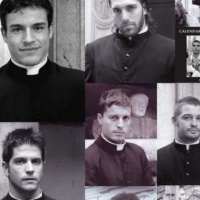Luke 24 verses 13 to 35 – The Walk to Emmaus
A Sermon for the evening of Easter Day
Reading a blog by a ministerial colleague (and fellow graduate of my Alma Mater), entitled “The man who passed through Fiumicino Airport, and though he had visited Rome”, I was reminded of the old story of the old Outer Hebridean crofter who travelled by rail to Edinburgh for the first time.
“What’s it like?” asked his friends on his return. “Is the Capital City an interesting place?”
“Oh, aye, interesting indeed, indeed – mair than interesting, I would say. Amazing, in fact. The whole city has a glass roof over it!”
Of, course, he’d never left Waverley Station!
And, as a result, saw and experienced only a tiny and limited area of Edinburgh – in other words, he missed the big picture.
One of my favourite bands is the Waterboys. Perhaps their best known song is “The Whole of the Moon”
I suppose that Mike Scott the lyricist and composer’s words can be interpreted on several levels.
But aren’t they essentially about the person with limited vision – contrasted with someone who sees that bigger picture?
Here are some of the words:
“I saw the crescent; you saw the whole of the moon.
“I spoke about wings; you just flew
“I saw the rain dirty valley; you saw Brigadoon…..”
….and so on
And us? How many of us see only the crescent and not, as others do, those who are perhaps more spiritual, the whole shining lunar glory?
St Luke in his Gospel tells a tale of this kind of partial vision.
It’s a well known story – perhaps, as someone has remarked, the best short story in the world.
It recounts two travellers’ lost hope, and shattered dreams.
It is an account of blinkered vision – an inability to take in the bigger story
We’re told that “Their eyes were restrained, so that they did not know him” – they didn’t recognise the Risen Christ who walked with them on that road from Jerusalem to Emmaus that evening of Resurrection Day.
Why? Why didn’t they recognise him? Well, for a start, He was dead and buried – dead men don’t come back to life….. but there’s perhaps more to this. Could it have been the case that they were expecting someone quite different? An all conquering warrior King? And, if that were the case, then how limited had their vision been!
After all, did they not say “We were hoping that he was the one who was going to set Israel free” And that in a military or political sense.
How often do we have our hopes dashed because we aim low? We want the crescent, as it were, without trying for the Moon.
Cleopas and his companion anticipated a limited redemption, a release from Roman occupation, based, I assume, on a military conquest or coup; this hadn’t happened – Jesus, on whom they had pinned all their hopes, had been crucified as a criminal, and the cause now seemed lost.
In today’s world, many misguidedly think that a violent solution is the only answer to realise their cause.
But, in the long run, what do groups like Isis/ Daesh hope to achieve by slaughtering innocent men, women and children – in Paris, Brussels, Syria? What is achieved by Zionists killing Palestinians? Or today (Easter Sunday – 27 March) the wholesale murder of Pakistani Christians, including children, in Lahore. All this indiscriminate murder will never succeed – never. It isn’t an answer; it strengthens the resolve of those whom they attack.
Some see only a part; impulsively act upon it; ultimately fail.
It is pointless to subscribe to the limited solution of strife and wonton violence – it always fails.
I recently rewatched Mel Gibson’s “Braveheart” Soon after it came out, Billy Connolly criticised it in no uncertain terms, effectively saying that it pandered to those with a limited and blinkered view of history.
It may be a gung ho, all action caper – but that’s it; it’s historically inaccurate, and, more than that, shows only part of the picture. Further, some have high jacked its limited message for their own, limited, blinkered, narrow world view, based on xenophobia and hatred.
There is so much more to a sense of national pride than racial hatred.
One can be proud of one’s heritage, without resorting to parochialism, abuse, and ethnic glorification at the expense of others. Ultimately, the “Braveheart” view of history fails, because those who subscribe to it, see only part of the picture – the crescent, if you like, and not the whole of the moon.
Cleopas and his companion, on the road to Emmaus, had tunnel-vision – their only hope had been based on the one who would liberate Israel and that person would, in their mind, be a mighty, all-conquering, all-destructive King who would rout the occupying Romans …. but he didn’t, being executed instead, and their hope – their limited hope – was shattered.
That’s why they say, in what must be one of the saddest, most heart-rending lines in all of Scripture: “We were hoping that it was he who was going to set Israel free”
There are countless people in our world today who have abandoned hope.
Even although quite sincerely and genuinely, they feel that there is no longer much in life for them, there can be something beyond the NOW that is whole, or better, or positive. Perhaps a loved one has died, or a relationship has failed, or a job has been terminated, or someone has let them down badly. But, so often, in the long run – even although they may not anticipate it nor see it, there can be something beyond the present, above the failure and frustration of the present hour.
I’ll be honest and I’ll say this – I can’t tell you what it may be, or when it may happen, but in God’s hands, all is possible.
Remember the apparently hopeless Cleopas and his companion, who, towards the end of the story, through the eyes of faith, SAW the hope, SAW the reality of better things to come, when they RECOGNISED the one who can never be defeated – Jesus Christ, who walks every road with us, and especially the road of despair and apparent hopelessness. He can open OUR eyes to the fuller picture; he can take us above and beyond our present fears or disappointments, so that our hearts may burn within us….in hope, expectation, and renewed joy.
It may not happen NOW, or tomorrow, or the day after, but let me draw your attention to Peter – not Peter the Rock, but Peter the man with doubts and with blinkered vision; the Peter who denied his Lord, because he couldn’t see beyond the immediate crisis of crucifixion, but who, on reflection (and looking at the bigger picture), was able to say to the people – you too can be part of this bigger picture; repent and be baptised; give up the things that tie you down to the here and now…..become part of the bigger picture that is the Kingdom, and which Christ has come , lived, died and risen again to usher in!
And, as he writes in his Epistle: “Fix your faith and hope on God”
Some may see only the crescent – but those who have encountered Chist for themselves, like Cleopas and his companion, see, once their eyes have been opened by him…THE WHOLE OF THE MOON!!!
I walk the dark Emmaus road
With God so far away.
Despair has left me broken here
Too weak and blind to pray.
One comes to me I cannot see
And helps me understand.
Through passing sorrows now I know
A wise and loving hand.
When pain or loss consume my joy,
I cry for quick relief,
But God would treat a deeper need:
My fear and unbelief.
You know my need, You know my path
With all that lies ahead.
Stay near, my Lord, my God, my Host,
And break my daily bread.
Words by Ken Bible
© 2007 by LNWhymns.com. CCLI Song #5009905.
Common Metre tune – Stracathro






